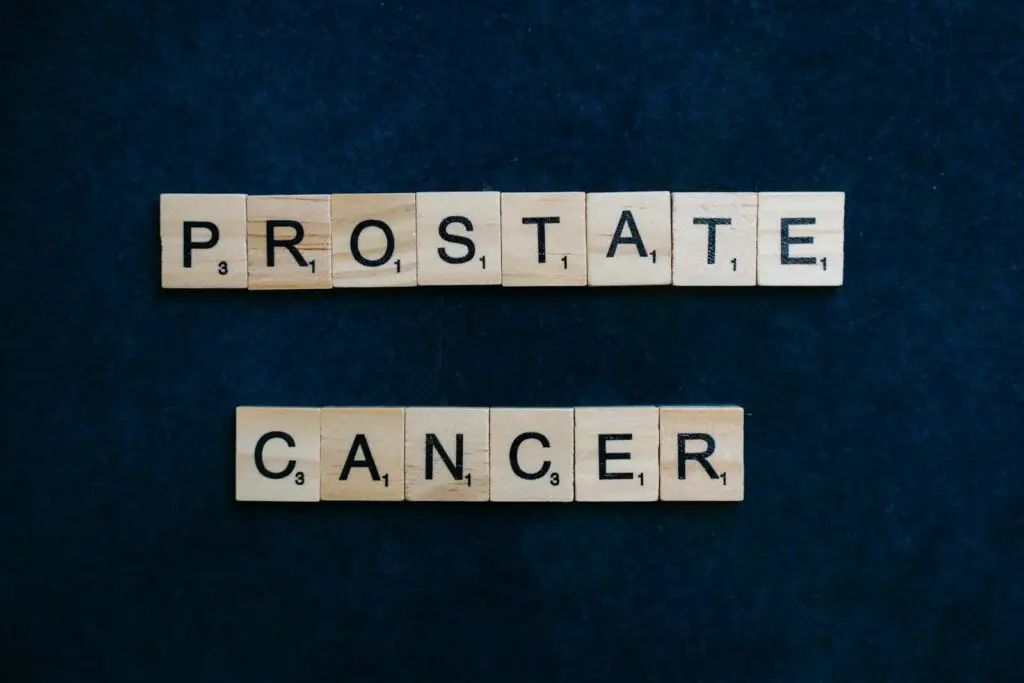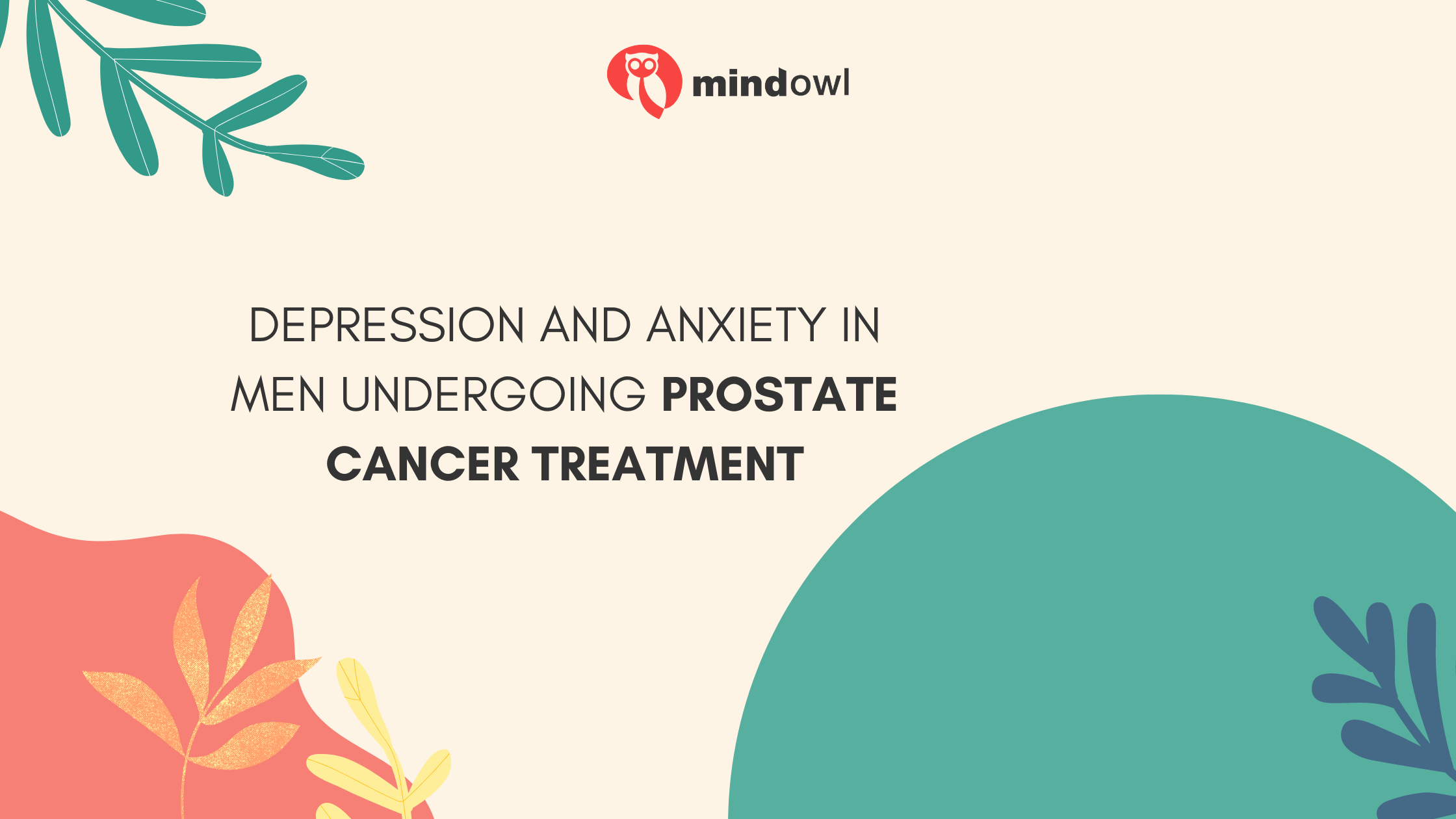Dealing with prostate cancer is tough for men. One fact stands out – many face anxiety and depression during treatment. This article will show ways to tackle these mental health challenges.
Let’s start the conversation.
Key Takeaways
- Men with prostate cancer often feel very sad and worried during treatment. This is called depression and anxiety.
- Doctors use a therapy that lowers testosterone to fight the cancer, but it can make men feel moodier and have trouble sleeping.
- Talking to a therapist or joining a support group helps men share their feelings and cope better.
- Learning stress management techniques like deep breathing or yoga can calm tension.
- Treatments for these mental health challenges include special talking therapies and medicines prescribed by doctors.

Understanding the Psychological Impact of Prostate Cancer Treatment
Prostate cancer treatment can have a significant impact on the psychological well-being of men. Individuals undergoing treatment, including those receiving prostate cancer treatment in Mexico, may experience depression and anxiety as a result of their diagnosis and the challenges associated with their medical care.
Depression in Prostate Cancer Patients
Many men with prostate cancer feel very sad and lose hope after they find out they have the disease. This feeling of deep sadness is called depression. It can happen before or after treatment starts.
Treatment for prostate cancer, like surgery or therapy to lower hormones, can make these feelings worse. Some men feel more depressed a year after their surgery.
Stress from dealing with symptoms and treatment adds to their worries. Studies show that this stress can lead to both depression and anxiety in patients receiving prostate cancer treatment.
Men who recently found out they are depressed might not get the best possible care. They also have a higher chance of not living as long compared to those who aren’t depressed. Finding early signs of depression is key to getting help fast.
Anxiety in Prostate Cancer Patients
Anxiety is a common feeling for men with prostate cancer. It can happen at any time during their journey, but studies show it’s more intense after surgery. Imagine dealing with the uncertainty of treatment outcomes or worrying about your PSA levels rising.
This fear doesn’t just fade away; some men still feel anxious even one year post-surgery.
Anxiety tends to be the most often experienced symptom for men with prostate cancer.
Dealing with anxiety isn’t easy, especially when you’re also facing a tough opponent like prostate cancer. The stats are clear – 18.5% of these men experience anxiety after their treatment.
Factors like psychological status and how long it has been since they first got treated play a big role here. Patients need support to navigate through this, making sure they don’t face these worries alone.
Factors Influencing Mental Health During Treatment
Role of Androgen Deprivation Therapy
Androgen deprivation therapy, or ADT, is a key treatment for men with prostate cancer. Doctors use it to lower testosterone levels or block its effects. This can help slow down the growth of cancer cells.
ADT works by either stopping the body from making testosterone or by blocking its action on cancer cells.
This therapy has some side effects that can impact a man’s life significantly. These include hot flashes, mood swings, and problems sleeping. Men might also experience lower sex drive and issues with getting an erection.
Understanding these side effects helps patients prepare and manage them better during their treatment journey against prostate cancer.
Effects of Other Treatment Modalities
Other treatments for prostate cancer, like surgery or radiation therapy, also impact a man’s mental health. Surgery can lead to physical changes that affect how a man sees himself, stirring up feelings of anxiety or depression.
Radiation therapy might cause tiredness and other side effects that make daily life harder, adding stress and worry.
A study found that men receiving these treatments often face challenges in adjusting to their new lives. They may worry about cancer coming back, which adds another layer of anxiety.
To cope with these changes, some find joining support groups helpful where they can talk with others facing similar situations. It’s key for patients to have access to mental and social support interventions during this time.
Going through prostate cancer treatment isn’t just a physical battle; it’s a mental one too.
Identifying Symptoms and Seeking Help
Recognising Early Signs of Depression and Anxiety
Identifying early signs of depression and anxiety is key to getting help. Men with prostate cancer often face these challenges during their journey.
- Trouble focusing on tasks can mean the brain is dealing with too much stress.
- Feeling very tired might not just be about the body fighting cancer; it could signal depression.
- Experiencing feelings of guilt or thinking you’re worthless are common in depression among prostate cancer patients.
- Anxiety often shows up first as nervousness or worry that won’t go away, especially prevalent in men undergoing androgen deprivation therapy for prostate cancer.
- Being irritable more than usual can indicate underlying anxiety among men with prostate cancer.
- Losing interest in activities once enjoyed is a significant sign of depression, a problem many men face after a prostate cancer diagnosis.
- Changes in eating or sleeping habits can be the body’s response to emotional distress from dealing with advanced prostate cancer.
- Physical symptoms like headaches or stomachaches without a clear cause may be linked to anxiety and depression in patients with localised prostate cancer.
- Avoiding friends or social activities is often a practical warning of major depression among survivors.
Each symptom points towards the necessity for psychological interventions and tailored therapy options for those diagnosed and living with prostate cancer, ensuring they have access to comprehensive support throughout their treatment journey.
Importance of Mental Health Support Systems
Mental health support systems play a key role for men undergoing prostate cancer treatment. These systems help in dealing with mood disorders, anxiety, and depression. Men receiving androgen deprivation therapy often face tough times mentally.
A strong support network can offer the guidance and care they need.
Doctors, therapists, and support groups dedicated to cancer care make a big difference. They provide methods on how to cope better with the stress of diagnosis and treatment. This ensures patients do not feel alone in their journey against prostate cancer.
Treatment and Management of Mental Health
Psychological Interventions
Fighting depression and anxiety is a big part of dealing with prostate cancer treatment. Psychological interventions play a critical role in helping men through this tough time.
- Counselling Sessions: Regular one-on-one talks with a therapist help patients share their fears and thoughts.
- Group Therapy: Sharing experiences with others facing similar challenges provides mutual support and understanding.
- Stress Management Techniques: Learning methods like deep breathing, meditation, or yoga helps manage tension.
- Cognitive Behavioural Therapy (CBT): This approach teaches men to change negative thought patterns related to their prostate cancer diagnosis.
- Lifestyle Advice: Professionals offer guidance on diet, exercise, and sleep habits that improve mental health.
- Online Support Platforms: Digital tools provide resources and forums for patients to seek advice and comfort from home.
- Mindfulness Training: Men learn to focus on the present moment, reducing worries about the future or regrets over the past.
- Family Counselling: Helps family members understand what their loved one is going through and how they can offer support.
- Physical Activity Programs: Exercise routines are tailored to boost mood and reduce fatigue during treatment.
- Art and Music Therapy: Creative outlets offer an escape from treatment routines and a way to express feelings non-verbally.
- Patient Education Programs: Understanding their condition empowers men to make informed decisions about their health care options.
Each of these interventions aims at improving not just the mental but also the physical wellbeing of men undergoing prostate cancer treatment.
Medication and Therapy Options
- Medication Options:
- Antidepressants, such as selective serotonin reuptake inhibitors (SSRIs) or serotonin-norepinephrine reuptake inhibitors (SNRIs), may be prescribed to manage depressive symptoms in men undergoing prostate cancer treatment.
- Anxiolytic medications, including benzodiazepines and buspirone, can help alleviate anxiety associated with prostate cancer treatment.
- Therapy Options:
- Cognitive-behavioural therapy (CBT) offers practical strategies to address negative thought patterns and cope with the emotional impact of prostate cancer.
- Supportive counselling provides a safe space for men to express their concerns and receive guidance on managing psychological distress throughout their treatment journey.
Conclusion
Men undergoing treatment for prostate cancer often experience heightened levels of anxiety and depression, which can significantly impact their overall well-being. It is crucial to recognise the signs of mental health struggles early on and seek appropriate support.
The use of psychological interventions, along with medication and therapy options, can play a vital role in managing the mental health challenges faced by these individuals. Addressing anxiety and depression in men receiving prostate cancer treatment is essential for improving their quality of life and overall outcomes.
Providing adequate support systems tailored to their specific needs can make a meaningful difference in their journey towards recovery.
MindOwl Founder – My own struggles in life have led me to this path of understanding the human condition. I graduated with a bachelor’s degree in philosophy before completing a master’s degree in psychology at Regent’s University London. I then completed a postgraduate diploma in philosophical counselling before being trained in ACT (Acceptance and commitment therapy).
I’ve spent the last eight years studying the encounter of meditative practices with modern psychology.

